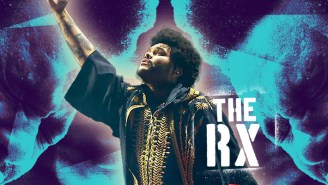Abel Tesfaye has been killing The Weeknd for at least five years, since the 2020 release of his fourth studio album, After Hours. While that album explored the themes of self-loathing and the alienating tendencies of the substances the character had always boasted about using, the music videos accompanying the project found the red-suited hedonist being decapitated and resurrected, only to suffer more abuse. The morbid motifs continued on Dawn FM, which boasted a purgatorial theme, with The Weeknd struggling to muddle his way through the wreckage of his life to achieve his final rest.
In the run-up to the release of Hurry Up Tomorrow, the latest and final installment of the loose trilogy, Tesfaye has suggested more than once that the album will constitute The Weeknd’s final end. It turns out to be a long goodbye, delivering the longest runtime of the three albums by far (After Hours is 56:19, Dawn FM is 51:49, and Hurry Up Tomorrow is 84:39). Tesfaye uses the sprawling canvas to empty the magazine, dumping every idea remaining from this phase of his artistic milieu — for better or worse.
This approach lends itself well to the Canadian singer-songwriter’s eclecticism, at the expense of the cohesion of the concept of the death of The Weeknd alter ego. In many ways, Hurry Up Tomorrow‘s title reflects both singer and his audience’s reluctance to let the persona go, despite its fixation on self-destructive habits both sides should have long since grown past (“Given Up On Me”). As an extension of the mythos of The Weeknd, the additional runtime allows him to sing his scumbag soliloquies over a broader palette than ever before. As an end to the character, one wonders if Abel is really a ready to let it die as he makes out.
But if this is the final “The Weeknd” album, the mysterious, menacing expression of id is going out with a bang — as only befits the “try anything twice, then do it ad nauseam” abandon of the curator of the House Of Balloons. Take “Timeless,” the Pharrell Williams-produced, Playboi Carti-featuring chest beater; “Dress for these hoes, they finna flock,” Carti sing-raps. “Just poured a four in a soda, it pop / Them drugs finna hit, I’m feelin’ ill / I’m wrestlin’ all of my demons, I feel like The Rock.” It’s a line that could fit in on practically any song from The Weeknd, a prime example of the triumphant highs that explain why he still chases them despite the morose lows of tracks like “Cry For Me” and “Baptized In Fear.”
Elsewhere, Tesfaye’s enthusiasm for various forms of dance-pop cracks open and spatters like a Pollock on the unfettered “São Paulo”; his penchant for ’80s soft-rock grasps for better times on “Take Me Back To LA”; and his maximalist, synth-opera tendencies are given free rein on “Red Terror.” But the album’s at its best when it’s more firmly on-topic; “The Abyss” channels the doomed dramaturgy of Scarface, while that film’s composer Giorgio Moroder makes an in-person appearance on “Big Sleep,” another gothic dirge in line with the theme of killing off The Weeknd. Lyrically, each of these songs is a fractured goodbye, a somber reflection on the damage The Weeeknd’s vices have done to his life and relationships. As eulogies, they’re fitting.
If the title track really is the end of the alter ego (it’s the final track on the standard version), it’s an oddly hopeful one for the self-declared “king of sin” (this thing could have used some tighter editing and sequencing, to be sure). But it’s also a watershed, the first time The Weeknd actually seems to offer any kind of consideration that isn’t self-regarding, insincere navel-gazing. An earnest Weeknd? That’s something new. Perhaps the next phase of Abel Tesfaye’s supernova career still has some surprises in store.
Hurry Up Tomorrow is out now via XO / Republic Records. You can stream it here.







